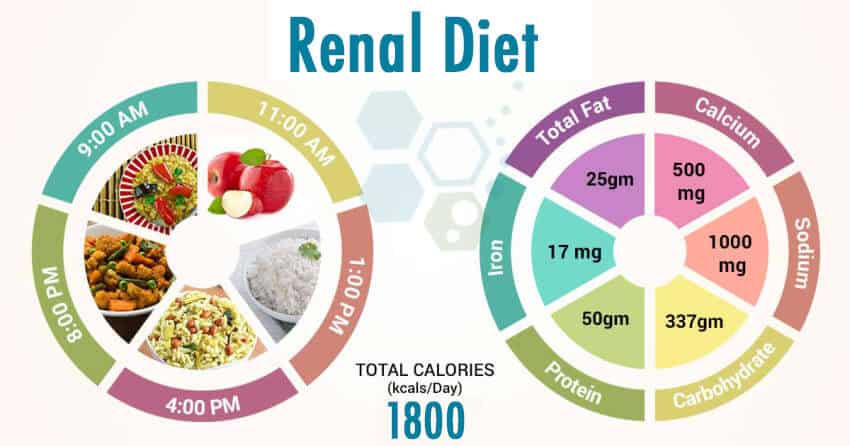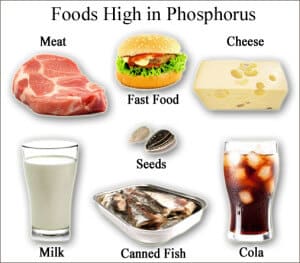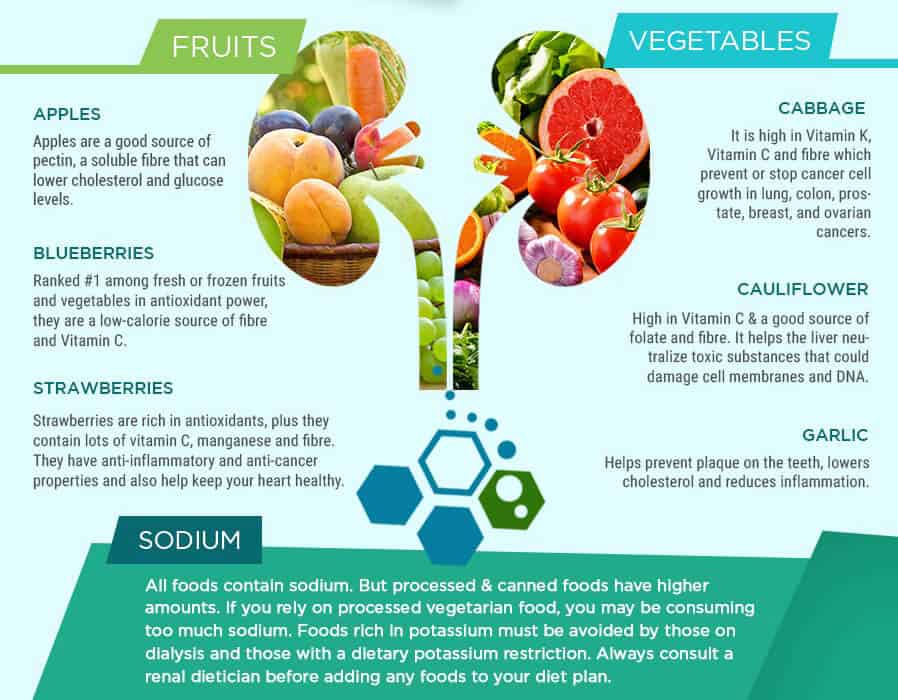Every day, it seems, medical researchers discover new links connecting chronic diseases, systemic inflammation, and the significance of what are known as “superfoods” in preventing or protecting against unwelcome fatty acid oxidation. It should come as no surprise, to anyone that there is indeed a direct relationship between kidney diseases, metabolic diseases and our diet. Knowing about these relationships is an excellent proactive way to help manage kidney health. [1]
The Kidney Disease Diet: Good Food for Healthier Kidneys
For over 12 years The Regeneration Center has been of the leading regenerative medical clinics in the world actively pursuing advancements in using renal stem cells for kidney disease therapy. We knows through first hand experience how interconnected the relationship between kidney disease and diet is. Taking the right approach to nutrition figures significantly into managing fatty acid oxidation and promoting one going kidney health before it becomes chronic kidney disease.
Fatty oxidation occurs when the oxygen in body tissues and organs reacts to the healthy fats found in our blood and the body’s circulating cells. Oxidation in and of itself is not a bad thing. It is a normal process. Oxidation is needed for the creation of energy and the production of vital chemical reactions in the body. The problem occurs when the oxidation of fats is excessive. This can result in too much cholesterol, which produces molecules called free radicals. These harmful molecules can damage vital proteins, cell membranes, and DNA.

Besides chronic renal diseases and diabetes there is a long list of illnesses and disorders that are associated with damage caused by oxidative stress including:
- Congestive heart failure, myocardial infarction & coronary atherosclerosis
- Cancer of the liver, lung cancer and prostate cancer
- Neural disorders like Alzheimer’s, Parkinson’s, MND and ALS
- Liver Failure
- Sensory Neuropathy
- Rheumatoid arthritis
With everything we know today about nutrition and antioxidants, the link between kidney disease and diet was hardly a shocker to the medical community.
How Diet and Nutrition Impact Kidney Disease
Once nephrologists understood what foods are bad for the kidneys and how antioxidants in diet can affect kidney disease, nutritional support health became a primary weapon in helping to manage the disease. Foods rich in antioxidants are known for helping to neutralize free radicals and protecting every tissue and organ in the body.
Kidney diet and foods for chronic kidney disease (CKD) precaution
Patients enrolled in the Renal Regeneration program are provided nutritional counseling that helps them maintain the healing and damage repair to kidney tissues that follow the kidney cell therapy procedure. A crucial part of long term success is by incorporating kidney protecting food that fights fat oxidation. The following foods offer an excellent choices for anyone with onset or late stage kidney disease.What is a good diet for chronic kidney disease?
A diet high in protein from fish, eggs, pork at every meal might be recommended by your doctor or nutritionist. Kidney disease patients on dialysis should limit eating 225 to 280 grams (8 to 10 ounces) of foods high in protein each day and they may also recommend adding egg white powder, egg whites or protein powder.
The Renal Diet & Foods That Are Good For The Kidneys
1) Red Bell Peppers (sweet pepper, pepper, or capsicum) – Red bell peppers are low in potassium while can add big-time flavors depending on how they are prepared. These crispy members of the pepper family are also a great source of vitamins C, A, B6, folic acid, and fiber. Red peppers contain lycopene, a fat oxidation fighter that ups the game in your favor regarding kidney disease and diet. Although Its best to eat red bell peppers raw they can be cooked in several healthy ways. They are excellent when served with a healthy dip or mixed into a variety of green, tuna or chicken salads. Bell peppers can also be roasted or grilled, which really enhances their natural flavor and livens up boring sandwiches, salads and omelets.
2) Onions – The humble onion is often overlooked as an ally in fighting kidney disease with diet. This popular root vegetable is low in potassium and has a powerful  antioxidant known as quercetin. Moderate amount of onions are suitable for kidney health, and also helps fight heart disease and many types of cancers caused by metabolic dysfunctions. Onions are also rich in chromium, and a flavorful addition to low-carb diet recipes. Adding onions makes it easy to avoid meal boredom. Onions come in a variety of types, from white to red to brown and more. Like garlic, onions can be eaten raw, grilled, baked, sautéed, or caramelized. The versatility of onions is wide enough to keep anyone following a renal diet from feeling deprived of flavor.
antioxidant known as quercetin. Moderate amount of onions are suitable for kidney health, and also helps fight heart disease and many types of cancers caused by metabolic dysfunctions. Onions are also rich in chromium, and a flavorful addition to low-carb diet recipes. Adding onions makes it easy to avoid meal boredom. Onions come in a variety of types, from white to red to brown and more. Like garlic, onions can be eaten raw, grilled, baked, sautéed, or caramelized. The versatility of onions is wide enough to keep anyone following a renal diet from feeling deprived of flavor.
3) Garlic – Garlic helps reduce cellular inflammation, lower cholesterol, boost circulating stem cells and even prevent plaque buildup on teeth. Keeping inflammation to a minimum makes a world of difference regarding kidney disease and diet and a broad range of other illnesses. Since many people impacted by kidney disease also struggle with cardiovascular problems, adding garlic into your diet can help improve circulatory system function. Garlic is available virtually everywhere and comes fresh in heads (bulbs), as an oil, minced in jars, or dried into a powder. You can add garlic to a variety of foods and recipes. Roasted garlic spreads on wheat toast or bagels are another great way to get compliments from your family and friends.
Healthier eating options for kidney patients
4) Apples – The health benefits of apples have been so well known for a long time time, and have been ingrained into our minds via the “apple a day kept the doctor away” rhyme which was written centuries ago. Apples can fight cholesterol and the fiber inside them can be used as preventative measures for constipation and to reduce the risk of developing heart disease or cancer. Depending on the variety of apple they can be eaten raw, baked, stewed, sauced, or juiced.[2]
5) Cranberries – These tart and tasty members of the berry family have long been prized for bladder and kidney health. Doctors in nearly every medical tradition, from western to eastern medicine have in some way recommended consuming cranberries to help fight urinary system infections and inflammatory bowel diseases. This delicious ruby-red berry is a staple on many shopping lists of patients with some autoimmune conditions and kidney disease. Cranberries are known for protecting the stomach from bacteria that cause ulcers. It protects the gastrointestinal tract lining and is an ally against fighting symptoms of diabetic nephropathy and ankylosing spondylitis. Cranberries or 100% cranberry juice can be consumed year long. It can also be used in sauce form, dried and added to salads or eaten whole as a handy snack.
6) Blueberries & Raspberries – Versatile berries full of phytonutrients like ellagic acid that helps neutralize free radicals known to cause cellular damage. These berries are also full of another potent antioxidant known as anthocyanins. Anthocyanins are responsible for raspberries’ bright red color while phytonutrients give the berries their blue color. Additionally, these berries are a great source of manganese, vitamin C, fiber folate and packed with natural compounds that decrease inflammation. New research has also shown that blueberries may help the brain resist some of the effects of aging.
How do you like your blueberries and raspberries? Fresh, frozen, or dried? In muesli cereal or topped with whipped cream? How about as a juice or as part of a fruit smoothie? Raspberry vinaigrette makes a delicious dressing! No matter how you consume them these mighty little berries are a great addition to a kidney friendly diet regimen. [3]
7) Cherries – Cherries may well be the king of anti-inflammatory berries. One cup of cherries per day has been shown to decrease inflammation. That alone can be a great reason to include them in your renal diet. However, like the other berries mentioned in this article, cherries do much heavy lifting in the antioxidant department and provide phytochemicals for optimal kidney health. Cherry fans across the world know there is no tastier snack than some fresh cherries. However, this versatile berry can also be made into a sauce that pairs spectacularly with beef, lamb or pork. Prefer your cherries juiced? You can juice them fresh at home or pick up a bottle at most grocery stores.
Kidney Diet after Renal Stem Cell Therapy
8) Strawberries – Like many other berries, strawberries announce their nutritional value with their bright red color. These popular berries are loaded with two kinds of phenols. Anthocyanins (which make strawberries red) and ellagitannins (diverse class of hydrolyzable tannins) are potent antioxidants that contribute to healthy kidney cell structure and check oxidative damage. Strawberries also add fiber to your diet and is packed with vitamin C and manganese. Strawberries are another multi-tasking fruit providing heart protection, acting as an anti-cancer food, and providing anti-inflammatory defense. Virtually any way you want to serve them, strawberries are a natural powerhouse when managing kidney disease with diet. You can add them to cereals, turn them into a smoothie, enjoy them in a salad, or slice them up or enjoy them as-is raw.
9) Egg Whites – Eggs are back on the menu! For those managing kidney disease and diet, the whites of the egg are your best choice. Even though egg yolks can be nutritious, they contain high amounts of phosphorus, making egg whites a much better choice for people following a renal friendly diet. Egg whites are pure, high-quality protein and provide all the crucial amino acids. For optimal kidney health, in particular, it is recommended that you opt for the whites of eggs rather than the yolk since egg yolks contain more phosphorus. One of the hallmarks of chronic kidney disease is that the kidneys cannot remove phosphorus well. Egg whites can be found in powdered form as well as fresh or pasteurized. Many people love egg white omelets or sandwiches. Add hard-boiled whites to fresh green or tuna salads for a quick protein boost. For those that are not fond of the taste of egg whites, you can “sneak” them into smoothies or shakes, and your taste buds will never know the difference

10) Olive Oil (EVOO) – Olive oil is a rich source of anti-inflammatory fatty acids. Cold pressed olive oil is a monounsaturated fat known for protecting the body against oxidation. It is also an excellent source of polyphenols and antioxidants that promote neurogenesis, fight inflammation and oxidation. This makes it an ideal addition for those wanting to manage a kidney friendly diet. Not only is olive oil a great ally to those managing kidney disease and diet, but this delicious oil has also been shown to help reduce rates of heart disease and systemic inflammation. Of the types of olive oil available, “virgin” and “extra virgin” contain the highest amounts of antioxidants. Use it as a salad dressing, as your go-to cooking oil, season it to make an elegant and tasty bread dip, or marinate for vegetables.
11) Fish & salmon – Like egg whites, fish is an excellent source for high-quality protein. However, it is fish’s omega-3 fats that particularly useful in fighting kidney disease. These healthy fats help lower LDL (low-density lipoprotein). That is the bad type of cholesterol behind many cardiovascular problems. Omega-3s do not just lower bad cholesterol. They also actively raise your good cholesterol, medically known as high-density lipoprotein. The Regeneration Center advises having fish as a main course no less than twice weekly. Some of the highest levels of omega-3s in fish can be found in albacore tuna, herring, mackerel, rainbow trout, and salmon.
12) Cauliflower – Another member of the powerful cruciferous veggie family. Cauliflower earns high marks for its vitamin C, folate, and fiber content. Cauliflowers are loaded with indoles, glucosinolates, and thiocyanates. You may not have ever heard of these three compounds, but their impact on patients with chronic and polycystic kidney disease comes from boosting the functions which can also help the liver. In particular, they aid the liver in neutralizing toxins that can damage DNA and the membranes of cells. Cauliflower pack a delicious and nutritious punch, whether served raw, baked, boiled, cooked, or steamed. Serve it raw as an appetizer with dip or put it in a salad. Serve it hot and seasoned with nutrient-rich herbs and spices like curry powders, turmeric or pepper. Cauliflower is also popular mashed and substituted for potatoes. In addition to all the vitamins and liver-boosting compounds, these veggies are also low carb, making them that much ideal for both the kidney failure diet and low carb diet.[4]
Want to Learn More?
The functional medical physicians at the Regeneration Center believe that the best defense against illnesses like kidney disease is preventative measures like proper nutrition. That is why management of kidney disease and diet go hand-in-hand. But even when these diseases cannot be avoided, nutrition is a major player in managing these severe illnesses. That is why our regenerative protocols and nutritional counseling are so closely allied.[5]
To learn more about using food as tool to fight kidney disease please contact us today.
Published Clinical Citations
[1] ^Ko GJ, Obi Y, Tortorici AR, Kalantar-Zadeh K. Dietary protein intake and chronic kidney disease. Curr Opin Clin Nutr Metab Care. 2017 Jan;20(1):77-85. doi: 10.1097/MCO.0000000000000342. PMID: 27801685; PMCID: PMC5962279.
[2] ^Anderson CA, Nguyen HA, Rifkin DE. Nutrition Interventions in Chronic Kidney Disease. Med Clin North Am. 2016 Nov;100(6):1265-1283. doi: 10.1016/j.mcna.2016.06.008. Epub 2016 Sep 13. PMID: 27745594.
[3] ^Vargas F, Romecín P, García-Guillén AI, Wangesteen R, Vargas-Tendero P, Paredes MD, Atucha NM, García-Estañ J. Flavonoids in Kidney Health and Disease. Front Physiol. 2018 Apr 24;9:394. doi: 10.3389/fphys.2018.00394. PMID: 29740333; PMCID: PMC5928447.
[4] ^Piyaphanee N, Chaiyaumporn S, Phumeetham S, Lomjansook K, Sumboonnanonda A. Acute kidney injury without previous renal disease in critical care unit. Pediatr Int. 2020 Jul;62(7):810-815. doi: 10.1111/ped.14218. Epub 2020 Jul 10. PMID: 32145130.
[5] ^Shi Y, Wang Y, Li Q, Liu K, Hou J, Shao C, Wang Y. Immunoregulatory mechanisms of mesenchymal stem and stromal cells in inflammatory diseases. Nat Rev Nephrol. 2018 Aug;14(8):493-507. doi: 10.1038/s41581-018-0023-5. PMID: 29895977.

